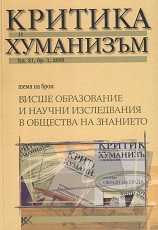Философията в българското образование до 1947 година
Philosophy in Bulgarian Education towards 1947
Author(s): Atanas StamatovSubject(s): Cultural history
Published by: Фондация за хуманитарни и социални изследвания - София
Keywords: philosophy; education; history of education
Summary/Abstract: “Bible classes and Moral admonition” was a discipline lectured all over the country during the period of Bulgarian resurgence, which the philosophical-ethical teaching was based on in the process of laying the groundwork of the new-Bulgarian education. The foundation of the first secondary schools, seminaries and pedagogical schools went hand in hand with the differentiating of cycle of subjects, where the philosophical-ethical knowledge was represented also explicitly. The regulation of this process became a task of the State after Liberation (1878). At the end of the XIX – the beginning of the XX century the system of philosophical-ethical education was fixed permanently in the Bulgarian schools. It had been including consecutively the following subjects: “Bible classes and moral admonition”, “Religion”, “Psychology”, “Logics”, “Ethics”, “Aesthetics” and “Civil Sciences”. The ethical-philosophical education was composed to fulfill value-forming functions and through them ideological functions. The stress was laid on the universal values – the important national values were put in the same context. Till the differentiation of “Philosophy” as a specialty in the Higher School (The University of Sofia), the Bulgarians were receiving higher educational qualification in philosophy abroad by scholarships, and later by specialization as institutions of knowledge. About 85 percents of these cases were connected with the German-lingual cultural space. The Ministry of National Education raised big claims towards each Bulgarian citizen graduated from Higher School abroad by means of The Law for Legalization of the Diplomas (1898). The fact that over 10 percents of the college of professors were members of foreign Academies of Science and almost the same percentage were “dr.h.c.” of foreign Universities revealed the intellectual potential that Bulgaria was producing during this period. The conclusion might be one and only – the Bulgarian intellectuals were a natural part of the European cultural community at that time. This philosophical-ethical segment in our educational system was reproducing philosophical in its popular and elite forms towards 1947 – and “feeding” mentally the moral immunity of the Bulgarian society. The events from the autumn of 1944 changed the situation completely. Marxist Philosophy received the statute of state philosophical doctrine in the process of so called “cultural revolution”. The crush of the inherited system of philosophical-ethical education came practically in the mentioned above 1947, when the discipline of “Ethics” was drown out of the educational curricula. A new, dominated by political-ideological aims, system was formed under the sign of class attitude. The free access to the philosophical centers in Western Europe was denied. The ambitions of the Bulgarians to study and specialize philosophy abroad were directed on Northeast – to “The State of Soviets”.
Journal: Критика и хуманизъм
- Issue Year: 2006
- Issue No: 21
- Page Range: 211-233
- Page Count: 23
- Language: Bulgarian
- Content File-PDF

